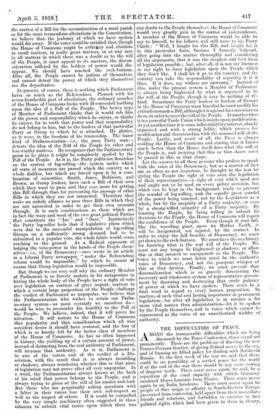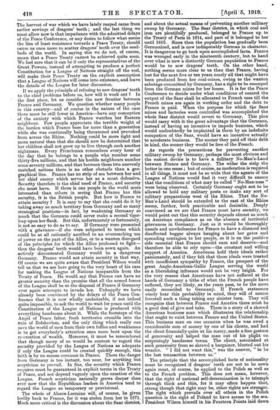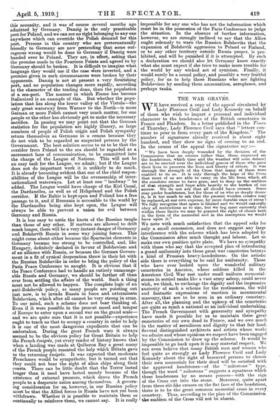THE DIFFICULTIES OF PEACE.
AMONG the innumerable difficulties which arc being discussed by the Peace Conference, three stand out prominently. These are the problems of drawing the new Franco-German frontier, of giving Poland access to the sea, and of framing an Allied policy for dealing with Bolshevik Russia. In the first week of the war we said that there could be no possibility of a settled peace for the world if at the end of the war there should be any more sowing of dragons' teeth. There must never again, we said, he a repetition of the cruel rapacity with which Germany sundered Alsace-Lorraine from France. There must never again be an Italia Irredenta. There must never again be people of Slav origin or affinity in South-Eastern Europe prevented from coalescing, held apart from their immediate friends and relations, and forbidden to exercise in fact political rights which had been given to them in theory. AMONG the innumerable difficulties which arc being discussed by the Peace Conference, three stand out prominently. These are the problems of drawing the new Franco-German frontier, of giving Poland access to the sea, and of framing an Allied policy for dealing with Bolshevik Russia. In the first week of the war we said that there could be no possibility of a settled peace for the world if at the end of the war there should be any more sowing of dragons' teeth. There must never again, we said, he a repetition of the cruel rapacity with which Germany sundered Alsace-Lorraine from France. There must never again be an Italia Irredenta. There must never again be people of Slav origin or affinity in South-Eastern Europe prevented from coalescing, held apart from their immediate friends and relations, and forbidden to exercise in fact political rights which had been given to them in theory.
The harvest of war which we have lately reaped came from earlier sowings of dragons' teeth ; and the last thing we mast allow now is that impatience with the admitted delays of the Peace Conference, or any desire to follow what seems the line of least resistance towards a Peace Treaty, should cause us once more to scatter dragons' teeth over the seed- beds of the world. In saying this we do not, of course, mean that a Peace Treaty cannot be achieved quite soon. We feel sure that it can bell only the representatives of the Great Powers, instead of attempting to produce a perfect Constitution for a League of Nations straight off the reel, will make their Peace Treaty on the explicit assumption that a League of Nations will come into existence, and leave the details of the League for later discussion.
If we apply the principle of refusing to sow dragons' teeth to the chief problems before us, how will it work out I In the first place, let us consider the new frontier between France and Germany. We question whether many people in this country—and of course in the nature of the case there must be still fewer in America—have any conception of the anxiety with which France watches her Eastern neighbour. Few people appreciate the terrible weight of the burden which France bore for more than a generation while she was continually being threatened and provoked from across the Rhine. Nothing could be more right and more natural than that she should now be determined that her children shall not grow up to live through such another nightmare. Every Frenchman remembers every hour of the day that he belongs to a people who number some thirty-five millions, and that his hostile neighbours number some seventy millions, and that between these two unevenly matched nations there is no other obstacle than a geo- graphical line. France has no strip of sea between her and her chief enemy which serves her as a moat defensive. Security therefore is the chief need of France, and security she must have. If there is one people in the world more interested than others in seeing that France has this security, it is the British people. But how is France to attain security I It is easy to say that she could do it by taking away eo much territory from Germany and so many strategical positions—in fact, by weakening Germany so much that the Germans could never make a second-tiger- leap upon her flank. But this, unfortunately'or fortunately, is not so easy to do as to say. If Germany were presented with a grievance—if she were subjected to terms which could be at all rationally ascribed to an overreaching use of power on the part of the Allies, or to a wanton disregard of the principles for which the Allies professed to fight— then the dragons' teeth would have been sown again. An actively discontented Germany would be a dangerous Germany. France would not attain security in that way. Of course we are quite aware that President Wilson would tell us that we are here going to the very heart of his case for making the League of Nations inseparable from the Treaty of Peace. He would say that France can have no greater security than the promise that all the armed forces of the League shall be at the disposal of France if Germany ever again attempts to invade her. Unhappily we have already been convinced by the delays of the Peace Con- ference that it is now wholly undesirable, if not indeed quite impossible, to ask the world to wait for peace until the Constitution of the League of Nations is produced with everything handsome about it. While the footsteps of the Angel of Peace falter, fresh territories crumble into the ruin of Bolshevism, and the only thing which really can save the world of men from their own follies and weaknesses is to get everybody's attention once more bent upon the re-creation of wealth. Moreover, it must be remembered that though many of us would be content to-regard the security provided by the League of Nations as adequate if only the League could be created quickly enough, this faith in by no means common in France. There the danger from Germany is too instant, too near, for anything but scepticism to prevail. In fine, the security which France requires must be guaranteed in explicit terms in the Treaty of Peace, and not depend vaguely upon the creation of the League. French scepticism naturally grows deeper than ever now that the Republican leaders in America tend to regard the League as temporary or provisional.
The whole of Alsace-Lorraine will, of course, be given bodily back to France, for it was stolen from her in 1871. Much more critical is the discussion about the Saar district. and about the actual means of preventing another military swoop by Germany. The Saar district, in which coal and iron are plentifully produced, belonged to France up to the Treaty of Paris in 1814, and part of it belonged to her until 1815. Since then the population has gradually been Germanized, and is now indisputably German in character. It is dangerous to go back upon accomplished facts. France was wronged early in the nineteenth century, but to hand over what is now a distinctly German population to France would be to sow dragons' teeth. On the other hand, nothing seems more clear to us than that France, having lost for the next five or ten years nearly all that might have been produced from her coal-mines, owing to the wanton sabotage committed by Germany, has a right to be recouped from the German mines for her losses. It is for the Peace Conference to decide under what conditions of control the output of the Saar shall be allocated to French uses till the French mines are again in working order and the debt to France is paid. When the purpose for which the Saar mines and factories were controlled was accomplished the whole Saar district would revert to Germany. This plan would carry with it the great advantage that the Germans, instead of having an incentive to impede business, which would undoubtedly be implanted in them by an indefinite occupation of the Saar, would have an incentive actually to accelerate business. The sooner they paid off their debt in kind, the sooner they would be free of the French.
As regards the precautions for preventing another military swoop by Germany; perhaps the most obvious and the easiest device is to have a military No-Man's-Land between France and Germany. The wider the strip the better in one sense ; but of course, as moderation is required in all things, it must not be so wide that the agents of the League of Nations would find it very difficult to ensure that the conditions of what may be called " No-Man-nem " were being observed. Certainly Germany ought not to be allowed to hold any military posts or make any sort of military preparations west of the Rhine. That the No- Man's-Land should be extended to the east of the Rhine seems, further, both practicable and desirable. Deeply convinced as we are that France must have security, we would point out that this security depends almost as much on American compliance as on the absence of territorial grievances in Germany. Just as it would be thoroughly unsafe and unwholesome for France to have a diseased and disaffected beggar always hanging about her gates and spreading contagion to her people, so it is on the positive aide essential that France should earn and deserve—and therefore be able to rely upon—the constant and willing support of America. Americans hold their ideals rather passionately, and if they felt that those ideals were treated with insufficient sympathy by France, the prospect of the great Anglo-American-Gallio League serving the world as a liberalizing influence would not be very bright. For the very reason that Americana have not suffered at the hands of Germany a tithe of what the French people have suffered, they are likely, as the years pass, to be the more easily reconciled to Germany. If French statesmen wisely bear this probability in mind, they will of course forestall such a thing taking any sinister turn. They will recognize that between France and America there must be a good deal of give and take. There is a story of a shrewd American business man which illustrates the relationship that ought to exist between France and the United States. This business man on one occasion when he was owed a considerable sum of money by one of his clients, and had the client financially quite at his mercy, ,made a fine gesture of generosity and helped the man out of his plight on surprisingly handsome terms. The client, astonished at such generosity from so shrewd a bargainer, blurted out his wonder. " I did not want this," was the answer, " to be the last transaction between us."
The principle that the accomplished facts of nationality must be recognized if dragons' teeth are not to be sown again must, of course, be applied to the Polish as well as to the French problem. This does not mean, however, that the right of national self-determination is to triumph through thick and thin, for it may often happen that, strong. though that right may be, other rights are stronger. The right which prevails over all others in the Polish question is the right of Poland to have access to the sea. President Wilson himself in his Fourteen Points laid down this necessity, and it was of course several months ago admitted by Germany. Danzig is the only practicable port for Poland, and we can see no right belonging to any one anywhere which can override the Polish demand for this port. Persons in this country who are preternaturally friendly to Germany are now pretending than some out- rageous wrong would• be done to Germany if Danzig were handed over to Poland. They are, in effect, asking that the promise made in the Fourteen Points and agreed to by Germany should be broken. It is difficult to imagine what language they would use if the case .were inverted, and a promise given in such circumstances were broken by their opponents. Danzig is not at present a very flourishing port, and no population changes more rapidly, according to the character of the trading done, than the population of a sea-port. The manner in which Fiume has become ftalianized is an example of this. But whether the popu- lation that lies along the lower valley of the Vistula—the only great waterway from Warsaw to the North—is more German or more Polish cannot very much matter, for one people or the other has obviously got to make the necessary sacrifice. In patting we may point out that the German statistics for the population are highly illusory, as large numbers of people of Polish origin and Polish sympathy return themselves as Germans in a census because they do not wish to be regarded as suspected persons by the Government. The best solution seems to us to be that the corridor from Poland to the sea should be regarded as a sacrosanct lane of communication, to be committed into the charge of the League of Nations. This will not be an easy task for the League, we admit; but if the League does not do important work it is unlikely to do much. It is already becoming evident that one of the chief respon- sibilities of the League will be the overseership of inter- nationalized waterways. Let at least one " landway " be added. The League would have charge of the Kiel Canal, the Dardanelles, as well as of Heligoland and the Polish corridor. If the Baltic is kept open and Poland has a free passage to it, and if Rumania is accessible to the world by the Dardanelles being also kept open, the League will always be able to prevent a union for evil between Germany and Russia.
It is less easy to untie the knots of the Russian tangle than those of any other. If matters are allowed to drift much longer, there will be a very instant danger of Germany and Bolshevik Russia in some way joining forces. This might come about either because the Spartacist elements in Germany became too strong to be controlled, and, like Hungary, definitely declared in favour of Bolshevism and of an alliance with Russia, or because the German Govern- ment in a fit of cynical desperation threw in their lot with the Russian Bolsheviks in order to bring the policy of the Paris Peace Conference to naught. It is obvious that if the Peace Conference had to handle an entirely unmanage- able Russia and Germany, we should be further off than aver from settling the affairs of the world. Such a thing must not be allowed to happen. The complete logic of an anti-Bolshevik policy, as many people are pointing out
Bjust now, is to invade Russia in force and exterminate olshevism, which after all cannot be very strong in, arms. To our mind, such a- scheme does not bear thinking of. Even if it were- possible.in the present mood and temper of Europe to enter upon a second war on the grand scale— and we are quite sure that it is not possible--experience ought to teach us that to occupy a country in order to help it is one of the most dangerous expedients that can be undertaken. During the great French wars it always seemed to be the obvious policy for Great Britain to help the French einigris, yet every reader of history knows that when a landing was made at Quiberon Bay a great many of the French people resented the help which Britain gave to the returning emigres. It was expected that moderate Frenchmen would be sympathetic, but it turned out that they could not bear the sight of alien ships along their coasts. There can be little doubt that the Terror lasted longer than it need have lasted merely because of the existence of external pressure, which drove the French people to a desperate union among themselvea. A govern- ing consideration for us, however, in our Russian policy must be that the Allied forces in Russia have not yet been withdrawn. Whether it is possible to maintain them or continually to reinforce them, we cannot say. It is really impossible for any one who has not the information which must be in the possession of the Paris Conference to judge the situation. In the absence of further information, however, we are strongly inclined to say that the Allies ought solemnly to warn the Russian Bolsheviks that the expansion of Bolshevik aggression to Poland or Finland, or to any other territory outside Russia proper, is pro- hibited, and will be punished if it is attempted. By such a declaration we should also let Germany know exactly what she must expect if she tries to make more trouble for the world by any wicked act of cynicism. Finally, it would surely be a sound policy, and possibly a very fruitful policy, for us to help those Russians who are fighting Bolshevism by sending them ammunition, aeroplanes, and perhaps tanks.








































 Previous page
Previous page